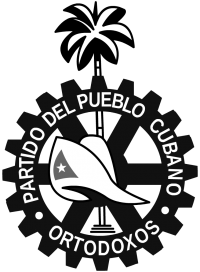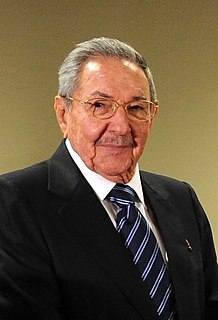Related Research Articles

Fulgencio Batista y Zaldívar was a Cuban military officer and politician who served as the elected president of Cuba from 1940 to 1944 and as its U.S.-backed military dictator from 1952 to 1959 before being overthrown during the Cuban Revolution. Batista initially rose to power as part of the 1933 Revolt of the Sergeants, which overthrew the provisional government of Carlos Manuel de Céspedes y Quesada. He then appointed himself chief of the armed forces, with the rank of colonel and effectively controlled the five-member "pentarchy" that functioned as the collective head of state. He maintained this control through a string of puppet presidents until 1940, when he was himself elected President of Cuba on a populist platform. He then instated the 1940 Constitution of Cuba and served until 1944. After finishing his term, Batista moved to Florida, returning to Cuba to run for president in 1952. Facing certain electoral defeat, he led a military coup against President Carlos Prío Socarrás that pre-empted the election.

Cuba has had a socialist political system since 1959 based on the "one state – one party" principle. Cuba is constitutionally defined as a Marxist–Leninist socialist state guided in part by the political ideas of Karl Marx, one of the fathers of historical materialism, Friedrich Engels, and Vladimir Lenin. Despite being regarded as a one-party Communist state, the Cuban nationalist ideology of José Martí is what serves as the main source of influence in Cuban politics. The present Constitution of Cuba, which was passed in a 2019 referendum, also describes the role of the Communist Party of Cuba to be the "leading force of society and of the state" and as having the capability of setting national policy. The 2019 Constitution of Cuba identifies the ideals represented by Cuban independence hero José Martí and revolutionary leader Fidel Castro as the primary foundation of Cuba's political system, while also stressing the importance of the influence of the ideas of Marx, Engels, and Lenin.

A one-party state, single-party state, one-party system, or single-party system is a type of sovereign state in which only one political party has the right to form the government, usually based on the existing constitution. All other parties are either outlawed or allowed to take only a limited and controlled participation in elections. Sometimes the term de facto one-party state is used to describe a dominant-party system that, unlike the one-party state, allows democratic multiparty elections, but the existing practices or balance of political power effectively prevent the opposition from winning power.

The Farabundo Martí National Liberation Front is one of the two major political parties in El Salvador.
The Liberal Party of Cuba, was one of the major political parties in Cuba from 1910 until the Cuban Revolution in the late 1950s, when it was exiled.
This article gives an overview of liberalism in Cuba. It is limited to liberal parties with substantial support, mainly proved by having had a representation in parliament. The sign ⇒ means a reference to another party in that scheme. For inclusion in this scheme it isn't necessary so that parties labeled themselves as a liberal party.

Elections in Cuba are held at municipal, provincial, and national levels. Cuba is a one-party state, with the Communist Party of Cuba being described as the "superior driving force of the society and the state" in the Constitution of Cuba, and all other political parties are illegal. Elections in Cuba are not democratic because the government does not allow free and fair voting.

The National Assembly of People's Power is the unicameral parliament of the Republic of Cuba. It is currently composed of 605 representatives who are elected from multi-member electoral districts for a term of five years. The current President of the Assembly is Esteban Lazo Hernández. The Assembly only meets twice a year, with the 31 member Council of State exercising legislative power throughout the rest of the year. The most recent elections were held on 11 March 2018. After the 2023 elections, the number of representatives will decrease to 474.

The Party of the Cuban People – Orthodox, commonly called Orthodox Party, was a Cuban left-wing populist political party. It was founded in 1947 by Eduardo Chibás in response to government corruption and lack of reform. Its primary aims were the establishment of a distinct national identity, economic independence and the implementation of social reforms.

The Popular Socialist Party is a communist party in Mexico. It was founded in 1948 as the Popular Party by Vicente Lombardo Toledano.

The Cuban Revolutionary Party – Authentic, commonly called the Authentic Party, was a political party in Cuba most active between 1933 and 1952. Although the Partido Auténtico had significant influence, it eventually became unpopular due to corruption scandals and, despite significant reforms, Fulgencio Batista returned to power.

The Popular Socialist Party was a communist party in Cuba. It was founded in 1925 as the Communist Party of Cuba by Blas Roca, Anibal Escalante, Fabio Grobart, Alfonso Bernal del Riesgo and Julio Antonio Mella. Mella acted as the party's leader until his assassination in Mexico in 1929. It was later renamed the Communist Revolutionary Union in 1939. After the electoral victory of the Auténticos in the 1944 elections, the party went into decline and eventually adopted the name "Popular Socialist Party" to appeal to the electorate.
The People's Party was a short-lived political party in Cuba. It was founded on November 7, 1900 by Diego Vicente Tejera. The People's Party sought to mobilize the working class of Cuba into political action. However the party failed to make any significant political breakthrough. Tejera took part in the Constituent Convention of 1901 as a delegate from the People's Party.
The Cuban National Party was a political party in Cuba. At the very beginning of the 20th century, it was one of the three main political parties on the island. The party favoured independence for Cuba.

The Communist Party is an Italian political party of Marxist–Leninist inspiration, founded in 2009. It defines itself as "the revolutionary political vanguard organization of the working class in Italy".

The Communist Party of Cuba is the sole ruling party of the Republic of Cuba. The party leads a one-party authoritarian regime in Cuba where dissidence and political opposition are prohibited and repressed. The Cuban constitution ascribes the role of the party to be the "leading force of society and of the state". It was founded on 3 October 1965 as a successor of the United Party of the Cuban Socialist Revolution, which was in turn made up of the 26th of July Movement and Popular Socialist Party that seized power in Cuba after the 1959 Cuban Revolution.

Parliamentary elections were held in Cuba on 11 March 2018 to elect members of the National Assembly of People's Power. Prior to the elections, President Raúl Castro declared he would not be seeking a new term, and a new President of the Council of State will be elected by the National Assembly. His deputy, Miguel Díaz-Canel, was subsequently elected as the new president. However, Castro remained the First Secretary of the Communist Party of Cuba, the most senior position in the country.

Parliamentary elections are scheduled to be held in Cuba in 2023 to elect members of the National Assembly of People's Power. They will be the first elections since 1976 in which neither Fidel nor Raúl Castro are involved. Miguel Díaz-Canel succeeded Raúl Castro, brother of Fidel Castro, as the First Secretary of the Communist Party of Cuba on 19 April 2021, marking the end of the Castro era in Cuba.

The 2020 United States presidential election in Florida was held on Tuesday, November 3, 2020, as part of the 2020 United States presidential election in which all 50 states plus the District of Columbia participated. Florida voters chose electors to represent them in the Electoral College via a popular vote, pitting the Republican Party's nominee, incumbent president Donald Trump, and running mate Vice President Mike Pence against Democratic Party nominee, former vice president Joe Biden, and his running mate California senator Kamala Harris. Florida has 29 electoral votes in the Electoral College.
References
- ↑ Elections in the Americas : a data handbook . Nohlen, Dieter. New York: Oxford University Press. 2005. pp. 206. ISBN 0199253587. OCLC 58051010.CS1 maint: others (link)
- ↑ "PF · PPC · Cuban Popular Party". partyfacts.herokuapp.com. Retrieved 2019-03-16.